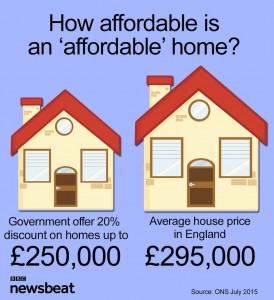Even discounted starter homes could be out of reach for the majority of families across the country, according to the Local Government Association.
Now we need to take this survey with a big pinch of salt as this falls into the category “well they would say that wouldn’t they” but while the hard numbers may not be accurate the overall picture is is the same as we would expect. Unfortunately.
According to the Local Government Association even discounted starter homes could be out of reach for the majority of families across the country.
Its analysis found that prices will be out of reach for all people in need of affordable housing in 220 council areas (67%) and are out of reach for more than 90% of people in need of affordable housing in a further 80 (25%) council areas.
 People in need of affordable housing are defined as those who would have to spend more than 30% of their household income to rent or buy a home.
People in need of affordable housing are defined as those who would have to spend more than 30% of their household income to rent or buy a home.
For the average earner with a 5% deposit, a 20% discount would make it possible to borrow enough to buy a starter home in just 45% of all council areas in England.
First-time buyers will be able to buy 200,000 new starter homes over the next five years (that is 40,000 homes a year) at a minimum discount of 20% to the market value. However, there is a demand for over 350,000 new homes a year. Discounted prices will be capped at £450,000 in London and £250,000 elsewhere.
The 20% discounts for new buyers would be funded by exempting developers from paying Section 106 contributions towards affordable rented housing and Community Infrastructure Levy contributions. In its own analysis, the Government has suggested that should 100,000 starter homes be built through the planning system, between 56,000 and 71,000 social and affordable rented homes would not be built.
Although house-builders will be able to build and sell starter homes below the price caps, councils are concerned that this could be difficult for developers to achieve without compromising on quality, particularly in areas with higher house prices.
Cllr Peter Box, LGA Housing spokesman, said:
“The private sector has a key role to play in solving the housing shortage, but it cannot build the 230,000 needed each year alone. Councils need to be able to ensure genuine affordable homes continue to be built for rent and sale across the whole country for future generations and the millions of people stuck on waiting lists.”
Brad Bamfield, CEO Joint EQuity, said “We need to get new entrants into the affordable market and to somehow change Local Authorities perceptions that only Housing Associations can provide affordable homes. At the moment LA’s make it very difficult for private companies to enter the market and that disadvantages buyers who need help. Private firms with private funds can deliver many new homes but we need to change the tenure structure.”
Joint EQuity has been providing shared home ownership homes from private funding since 2007 and allows the buyer to find their own home.
